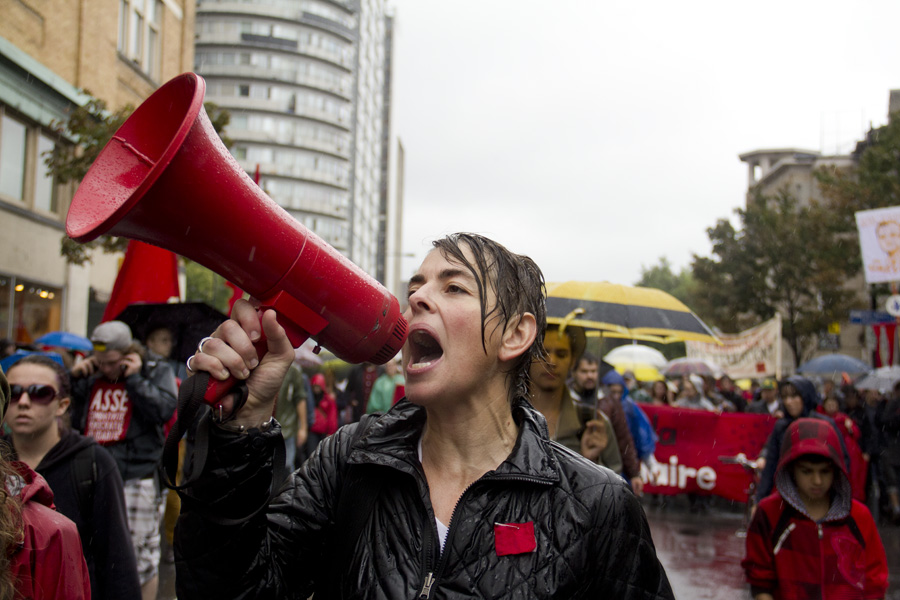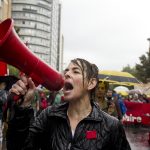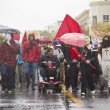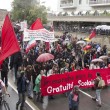On Saturday, students from several Montreal universities and CEGEPs participated in a demonstration for free education organized by the Coalition Large de l’Association pour un Solidarité Syndicale Étudiante (CLASSE). The Service de Police de la Ville de Montréal (SPVM) declared the demonstration illegal, and riot police in the downtown area dispersed demonstrators at around 4:00 p.m., putting an end to the march.
The march began at Parc Lafontaine Avenue and Cherrier Street, where demonstrators gathered at 2:00 p.m. The demonstration was considered by many to be a celebration of the Parti Québécois’ (PQ) recent cancellation of the tuition increase proposed by the previous liberal government, as well as a march towards the broader goal of free education for all.
“This demonstration is about bringing forward a project—to maintain and improve accessibility to higher education [by] bringing down any kind of tuition fees,” Jérémie Bédard-Wien, CLASSE finance secretary, said. “[We want to] improve our university system and make it answer the needs of the population, rather than corporate interests.”
Many students present at the demonstration expressed similar opinions to that of Bédard-Wien.
“What I think a lot of people have failed to realize [is] that for many of us, it wasn’t about tuition fees from the get-go,” Kyle McLaughlin, a third-year anthropology student at Concordia University, said. “It was about trying to build the society that we want to see.”
“I think [education] should be free for everybody,” Jasmine Latendresse, a first-year science student at Collège Lionel-Groulx, said. “It’s a right, and we shouldn’t have to pay for that.”
Bédard-Wien offered suggestions for how free education could become a reality in Québec.
“[Free education] is not a radical idea, as it is often painted by [the] media,” he said. “We could fund such a project [by] improving our fiscal taxation system, [and] perhaps by establishing a capital tax—a very small tax—on financial transactions, that would allow us to bring down user fees in public services, including education. There are also several improvements that can be made in the [financial] management of universities.”
CLASSE did not publish the route of the march in advance, which prompted the SPVM to declare the demonstation illegal, based on municipal by-law P-6—the “prevention of disturbances to the peace, public security and public order.” On their Twitter account, the SPVM confirmed that participants could continue demonstrating, provided that no criminal acts were committed.
SPVM policemen followed the march on foot from the sidewalks.
Until it arrived at the McGill University campus, the demonstration was predominantly peaceful. However, several masked demonstrators dressed in black hurled rocks at police cars parked in front of the Schulich School of Music Building, and jeered at riot police stationed in front of McGill’s Roddick Gates.
Physical confrontations between police and demonstrators broke out at the intersection of Peel and Sherbrooke, causing the demonstration to halt temporarily. Several demonstrators hit and chased police vans on Peel; riot police responded by pursuing the demonstrators in question into the larger crowd.
Following the confrontations, demonstrators reassembled and continued down Drummond Street, where riot police blocked access at several intersections, forcing the march to disperse.
Now that the PQ has frozen tuition, many students are looking to the summit on education—to be held by the PQ in the near future—for more progress. However, many participants in the demonstration had doubts about the intentions of the newly elected government.
“I think governments have to be pushed to have students’ interests in mind,” Bédard-Wien said. “The PQ … wants to index tuition fees to the cost of living, [but] students earning the minimum wage know very well that minimum wage is not indexed to the cost of living. If we are to go to the summit—which has not yet been decided—[we will convey] that any kind of indexation [is] opposed by students.”
“Some could see [the PQ] as an ally, but I personally think that they are still part of the old guard of political parties in this province who have a history of…corruption,” McLaughlin said. “I think they did what was required to get them elected.”
Many participants made it clear they would continue to voice their opinions in the coming months and, perhaps, years.
“[The cancellation of the tuition hikes] is a big step forward for the students, but it’s not where it should stop,” Latendresse said.
“The struggle is not over, and the struggle won’t be over until everyone has access to education everywhere,” McLaughlin said.










